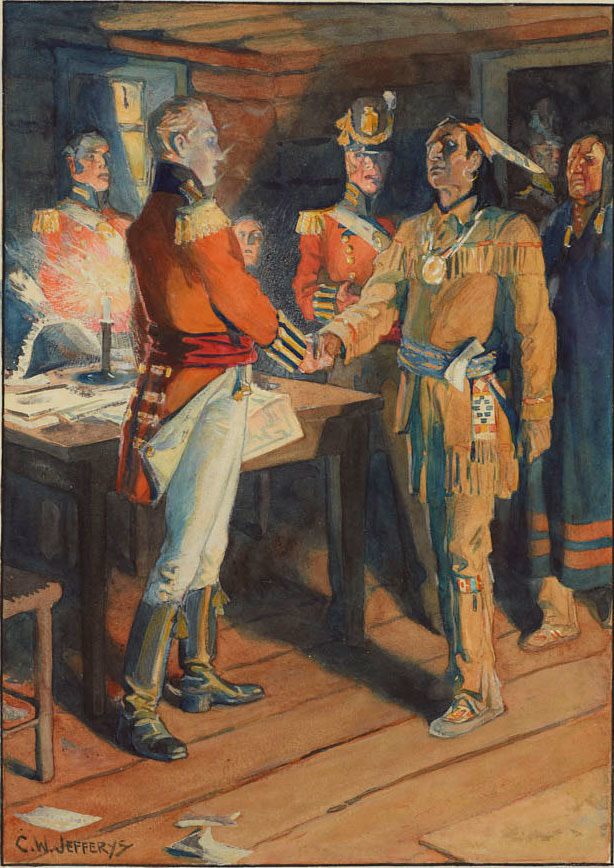WEEK 23
Tecumseh (1768 – 1813) was a Shawnee chief and warrior who promoted resistance to the expansion of the United States onto Native American lands. A persuasive orator, Tecumseh traveled widely, forming a Native American confederacy and promoting intertribal unity. Even though his efforts to unite Native Americans ended with his death in the War of 1812, he became an iconic folk hero in American, Indigenous, and Canadian popular history. Tecumseh was born in what is now Ohio at a time when the far-flung Shawnees were reuniting in their Ohio Country homeland. During his childhood, the Shawnees lost territory to the expanding American colonies in a series of border conflicts. Tecumseh's father was killed in battle against American colonists in 1774. Tecumseh was thereafter mentored by his older brother Cheeseekau, a noted war chief who died fighting Americans in 1792. As a young war leader, Tecumseh joined Shawnee Chief Blue Jacket's armed struggle against further American encroachment, which ended in defeat at the Battle of Fallen Timbers in 1794 and with the loss of most of Ohio in the 1795 Treaty of Greenville. In 1805, Tecumseh's younger brother Tenskwatawa, who came to be known as the Shawnee Prophet, founded a religious movement that called upon Native Americans to reject European influences and return to a more traditional lifestyle. In 1808, Tecumseh and Tenskwatawa established Prophetstown, a village in present-day Indiana, that grew into a large, multi-tribal community. Tecumseh traveled constantly, spreading the Prophet's message and eclipsing his brother in prominence. Tecumseh proclaimed that Native Americans owned their lands in common and urged tribes not to cede more territory unless all agreed. His message alarmed American leaders as well as Native leaders who sought accommodation with the United States. In 1811, when Tecumseh was in the South recruiting allies, Americans under William Henry Harrison defeated Tenskwatawa at the Battle of Tippecanoe and destroyed Prophetstown. In the War of 1812, Tecumseh joined his cause with the British, recruited warriors, and helped capture Detroit in August 1812. The following year he led an unsuccessful campaign against the United States in Ohio and Indiana. When U.S. naval forces took control of Lake Erie in 1813, Tecumseh reluctantly retreated with the British into Upper Canada, where American forces engaged them at the Battle of the Thames on October 5, 1813, in which Tecumseh was killed. His death caused his confederacy to collapse. The lands he had fought to defend were eventually ceded to the U.S. government. His legacy as one of the most celebrated Native Americans in history grew in the years after his death, although details of his life have often been obscured by mythology.(Wikipedia)
REQUIRED READING FOR THE WHOLE YEAR OF HISTORY OF THE USA
From the Publisher:
"For too long we’ve lacked a compact, inexpensive, authoritative, and compulsively readable book that offers American readers a clear, informative, and inspiring narrative account of their country. Such a fresh retelling of the American story is especially needed today, to shape and deepen young Americans’ sense of the land they inhabit, help them to understand its roots and share in its memories, all the while equipping them for the privileges and responsibilities of citizenship in American society. The existing texts simply fail to tell that story with energy and conviction. Too often they reflect a fragmented outlook that fails to convey to American readers the grand trajectory of their own history. A great nation needs and deserves a great and coherent narrative, as an expression of its own self-understanding and its aspirations; and it needs to be able to convey that narrative effectively. Of course, it goes without saying that such a narrative cannot be a fairy tale of the past. It will not be convincing if it is not truthful. But as Land of Hope brilliantly shows, there is no contradiction between a truthful account of the American past and an inspiring one. Readers of Land of Hope will find both in its pages."

